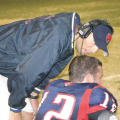There seems to be a phrase that every coach has embraced of late which I think needs a closer look, and it is "teaching life lessons." It's phrase you have probably heard a lot lately, so much so that it seems to have taken on a life of its own, particularly in the context of middle and high school sports.
To begin with, is it absolutely necessary that a child play sports to learn valuable life lessons? I don't think so. Does the way youth sports coaches interpret and teach life lessons up to them? I know so. Therein lies the problem. The life lessons that I see most coaches expressing and applying aren't what I consider proper, or fundamentally sound,for the good of the team, or the emotional well being of their young athletes. So many coaches are taking the life lesson crusade so far that it sends a message to the parents that they are either not capable of, or aren't doing a good enough of job, of parenting in teaching the life lessons that their child needs to learn to become a productive person in society. In many cases, the way a coach disciplines athletes will run counter to their parents' philosophy of discipline and end up undermining the parents' efforts to keep their child interested in sports. I know more adults that didn't even play sports in their school days who are just as well-adjusted, if not more well adjusted, than the ones that did play sports.
The concept of teaching life lessons has become so misinterpreted by so many coaches that there seems to be a blurry line between parenting and coaching. Coaches who are disciples of the life lesson mantra seem to be crossing that line. If a coach decides not tolet a bad officiating call (even at a critical point in the game) get under his or her skin and stays focused on what he needs to do next, he would be teaching, through his restraint, three important life lessons that may leave an indelible impression on his players, lessons they can carry with them for the rest of their lives: first, not to let a bad call by an official adversely effect how they play, second, how not to get distracted by something or, in this case, someone, we can't control; and third that life is sometimes unfair, so the best thing you can do is to move on and stay focused. No one harnessed this type of attitude better than Michael Jordan. He never argued with officials and kept his teammates focused on the task at hand. That's the kind of life lesson a coach needs to be teaching.
In contrast to that life lesson, the most common and destructive one that I see being taught by coaches occurs when a coach doesn't like a kid's body language and ends up getting verbally or emotionally abusive with the kid and/or responding by sitting them on the bench. The situation typically arises out of the player's lack of respect for a coach who has done nothing to gain that respect (this is a topic that was the subject of one of my recent blogs). Teaching this type of negative life lesson rarely accomplishes anything because a lack of respect by a child towards an adult or their peers is fundamentally a parenting issue, and to the extent it is involves the coach, doesn't address the root of the problem. Most of the time, the lack of respect being exhibited results from a combination of factors: it's partly the coach's fault, partly the kid's fault, and partly the parents' fault. Obviously, the coach can only address the part over which he has some control: his own behavior. As long as the coach is mature and self-aware enough to deal with that aspect of the problem, it can be worked out. If not, the coach is not likely to be able to create the synergy that it takes to for his team to be successful.
Returning to my earlier example, if a coach decides to respond to the calls of game officials that he doesn't like by questioning them game after game, he is sending a negative life lesson: that he doesn't value the referee, so it is okay to lose control of his emotions for a minute to let this official know how he feels. In the meantime, the coach becomes so distracted by his own emotions that he forgets what he needs to do next and loses sight of the game, which is likely to distract his team so that it loses focus and, when its play begins to suffer, inevitably prompting some parents to join the chorus criticizing the referee.
I could go on for chapters about what life lessons that a coach should and should not be teaching our children. But I'm going to finish this one with a message to all coache: that it's your job to teach what knowledge you have of the sport that your athletes don't already know, and that you should give very careful thought to what life lessons you are passing on to your team. Don't take it out on your athletes just because you don't like the way their parents are raising them. Remember, they don't need to play sports to learn valuable life lessons. They play because they love to compete, and to be around their friends. Not because they want to be around coaches.



















